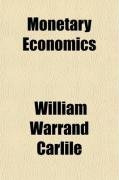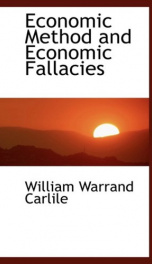monetary economics

Purchase of this book includes free trial access to www.million-books.com where you can read more than a million books for free. This is an OCR edition with typos. Excerpt from book: CHAPTER III OBJECTIONS TO THE VALIDITY OF THE APPEAL TO THE COMMON USE CONSIDERED We have arrived, then, tentatively at any rate, at the conclusion that the test of validity in the employment of economic or philosophical terms is to be found in the conformity of our use of them to the use of the same words in living speech ; that is to say, as regards economics, in the conformity of the theoretical with the business use. We have seen that every economist acts on the assumption that this test is conclusive when he is criticising the reasoning of his opponents ; at the same time, if we attempt to set the principle forth in explicit terms, we certainly cannot look for general and immediate assent. The difficulties, indeed, that its acceptance involves are, at first sight at any rate, formidable. This chapter will be devoted to the attempt to deal with some of them, and, in dealing Avith them, it may be possible incidentally to bring out with greater clearness the true nature of the principle itself. Objection 1. The Alleged Ambiguity of Popular Language. The first objection to be dealt with is the instability of meaning commonly attributed to popular language itself. Is it not notorious, it will be asked, that the popular use of economic terms is in the highest degree variable ? How then can an appeal be made to that which is in itself so unstable ? There is plainly, however, some misunderstanding here. If the meaning of such words as Price, Value, and the like was as unstable as the economists so generally assert, the business of the world could never get itself transacted. We know that millions of pounds sterling change hands every week in the Stock Exchanges in transactions conducted purely by word of mouth, and that the cases in which disputes or misunderstandings ar...
Info about the book
Author:
Series:
Unknown
ASIN:
B008C4PHJA
Rating:
2.5/5 (5)Your rating:
0/5
Languge:
English
Users who have this book
Users who want this book
What readers are saying
What do you think? Write your own comment on this book!
write a commentGenre
if you like monetary economics try:
Other books by this author
Do you want to read a book that interests you? It’s EASY!
Create an account and send a request for reading to other users on the Webpage of the book!



